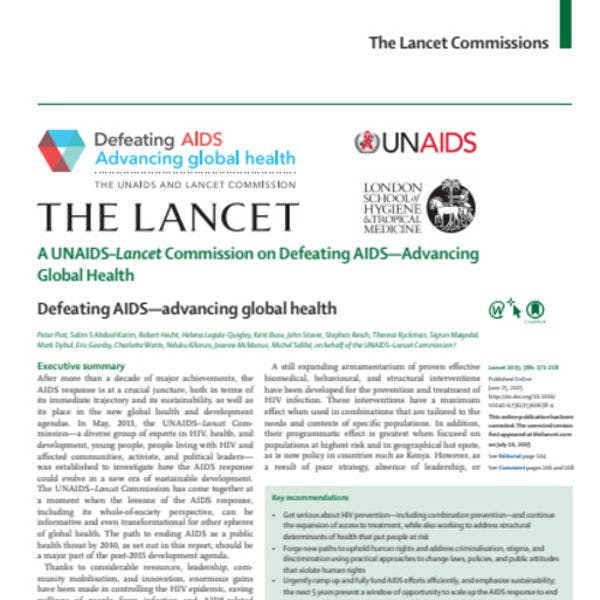Derrotando al SIDA – impulsando la salud a nivel global
Este informe sostiene que sólo a través de una masiva y rápida expansión de una respuesta integral al SIDA entre el momento actual y el año 2020 puede lograrse la ambiciosa meta de las NN.UU. de acabar con la amenaza del SIDA para la salud pública para el año 2030. Más información, en inglés, está disponible abajo.
Suscríbase a las Alertas mensuales del IDPC para recibir información sobre cuestiones relacionadas con políticas sobre drogas.
After more than a decade of major achievements, the AIDS response is at a crucial juncture, both in terms of its immediate trajectory and its sustainability, as well as its place in the new global health and development agendas.
In May, 2013, the UNAIDS–Lancet Commission—a diverse group of experts in HIV, health, and development, young people, people living with HIV and affected communities, activists, and political leaders—was established to investigate how the AIDS response could evolve in a new era of sustainable development. The UNAIDS–Lancet Commission has come together at a moment when the lessons of the AIDS response, including its whole-of-society perspective, can be informative and even transformational for other spheres of global health.
The path to ending AIDS as a public health threat by 2030, as set out in this report published in The Lancet should be a major part of the post-2015 development agenda.
Only a massive and rapid expansion of a comprehensive AIDS response between now and 2020 can achieve the highly ambitious UN goal of ending AIDS as a public health threat by 2030. A continuation of already major efforts will mean going backwards: by 2020 there will be more new HIV infections, more AIDS-related deaths, and the costs of controlling the epidemic will continue to escalate. However, if the most is made of this 5 year window of opportunity, HIV transmission should be reduced to low endemic levels, AIDS-related mortality greatly reduced, and mother-to-child transmission virtually eliminated by 2030.
The return on investment in the AIDS response is high. When survival gains are valued in monetary terms as part of a full income approach to economic welfare—as was done for the Lancet Commission on Investing in Health report1—each life-year gained in low-income and middle-income countries has an estimated value of 2·3 times gross domestic product (GDP) per person. Our modelling suggests that scaling up to the most ambitious scenario would generate benefits of US$1157 billion between 2014 and 2030. But success is by no means certain, and gains to date are fragile. At the same time, a long-term view is needed to ensure sustainability of achievements.
Key recommendations
- Get serious about HIV prevention—including combination prevention—and continue the expansion of access to treatment, while also working to address structural determinants of health that put people at risk
- Forge new paths to uphold human rights and address criminalisation, stigma, and discrimination using practical approaches to change laws, policies, and public attitudes that violate human rights
- Urgently ramp up and fully fund AIDS efforts efficiently, and emphasise sustainability; the next 5 years present a window of opportunity to scale up the AIDS response to end AIDS as a public health problem by 2030; failing to do so, and to continue the already significant efforts, will increase the number of deaths and new HIV infections by 2020
- Demand robust accountability, transparency, and better data; this relies on fresh processes and mechanisms to enable more transparent data review, improve research on high-risk populations, and link data to policies and programmes
- Reinforce and renew the leadership and engagement of people living with HIV, strengthening and expanding their decision-making roles in policy design, implementation, and evaluation, and invest in activism as a global public good
- Invest in research and innovation in all facets of the AIDS response; an effective vaccine and a cure remain priorities, and others include epidemiological studies of high-risk populations and hot spots, socio-behavioural research, implementation research, and country-specific research on how services are delivered across health care
- Promote more inclusive, coherent, and accountable AIDS and health governance; establish a multi-stakeholder, multi-sector platform to address determinants of health.
Keep up-to-date with drug policy developments by subscribing to the IDPC Monthly Alert.
Descargas
Regiones
Perfiles relacionados
- The Lancet
